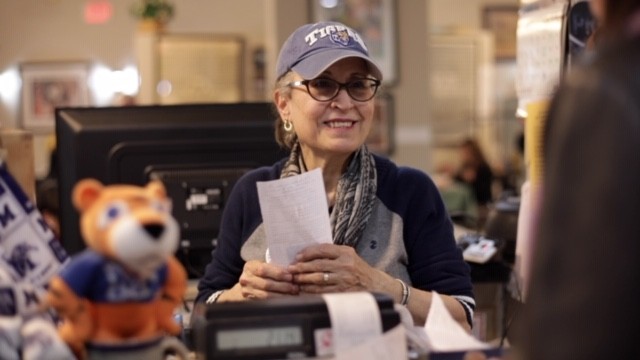 Courtesy of Last Bite Films.
Courtesy of Last Bite Films.
Suhair Lauck at her post behind the cash register in the documentary The Little Tea Shop.
As director of operations for Indie Memphis, Brighid Wheeler has had a crazy year. She and her organization have been charged with trying to figure out how to throw a film festival amid a worldwide pandemic. “I think the biggest challenge — I don’t necessarily want to speak for the whole team, but I think it would resonate with each team member — has been reminding yourself that every situation needs to be rethought. The moment you find yourself approaching something in the same way you would have pre-pandemic, you need to start over.”
The 2020 festival, which began on Wednesday night, is taking place online and outdoors. Indie Memphis has already moved their weekly programming online with the help of Memphis-based cinema services company Eventive. The staff, who specialize in in-person events, have had to learn to become broadcasters on the fly. There’s been a lot of time spent teleconferencing, says Wheeler. “Suddenly, you become an expert in a very specific sense on Zoom, like for our Tuesday nights, when we’re doing our weekly screenings and, [artistic director] Miriam [Bale] was hosting various industry people and having conversations about films with a filmmaker or a critic.”
But the new challenges have brought new opportunities. Wheeler says this has been driven home for her as the team records filmmaker interviews for the festival. “I’m reminded sitting through these Q&As that this is such a unique opportunity. Of course, I would prefer to have these filmmakers physically in Memphis. We are Indie Memphis. That’s our brand. But I’m able to have the majority of the filmmakers for each short film block in attendance for the Q&As. That is just something that is not always afforded to us at the in-person festival.”
Wheeler is in charge of programming the short films for the festival. This year, there are almost 200 of them, organized in themed blocks, all of which are available online. “In my time programming Indie Memphis, I’ve never been as proud of a shorts program as I am about this one,” she says. “I think that speaks to a number of different things, but I want to highlight first and foremost Kayla Myers, who has been a great addition to our programming team.”
On Thursday night, Indie Memphis takes over all four screens at the Malco Summer Drive-In. The Hometowner Documentary Shorts program, which begins at 6:30 PM, features both Memphis filmmakers and newcomers. It begins with “American Dream Safari,” G.B. Shrewsbury’s portrait of Tad Pierson, the Bluff City tour guide operator whose expertise in local music sites is unrivaled. Zaire Love, a graduate of the Crosstown Arts residency program, takes audiences on the “Road to Step,” which examines Black fraternity culture’s step show competition at Ole Miss. Artistic polymath Donald Meyers’ “The Lonely” is an intimate portrait of elderly isolation, and a plea for compassion. Bailey Smith’s “Holding On” is a chronicle of Memphis musician Don Lifted’s first U.S. tour. Matthew Lee urges the audience with “Remembering Veteran’s Day.” Emily Burkhead gets experimental with the hybrid doc “She Is More,” featuring musician Jordan Occasionally. Tyler Pilkington’s “Teched Out” explores the frontier of transhumanism, where the line between human and machine is blurred. Kierra Turner chronicles NBA player Jonathan Stark’s recovery from a potentially career-ending injury in “Wake ‘Em Up.” Josh Cooper’s “Loose Leaves” brings the story of a group of Black women entrepreneurs in Orange Mound. And finally, Matteo Servante and Molly Wexler’s “Little Tea Shop” gives you the background on the famous Downtown restaurant where you can find power players seated next to a person experiencing homelessness, and the immigrant restauranteur Suhair Lauck who brings them together.
“It’s an introduction to Memphis,—a taste of different areas and people within our city,” says Wheeler. “We know how hardworking our filmmakers are, but to see, even through the pandemic, the resilience they continue to display as they make their work is nothing short of amazing.”
Indie Memphis 2020 continues through Thursday, October 29. You can buy online and in-person passes at indiememphis,org.
 Darius B. Williams for Striking Voices
Darius B. Williams for Striking Voices  Darius B. Williams for Striking Voices
Darius B. Williams for Striking Voices